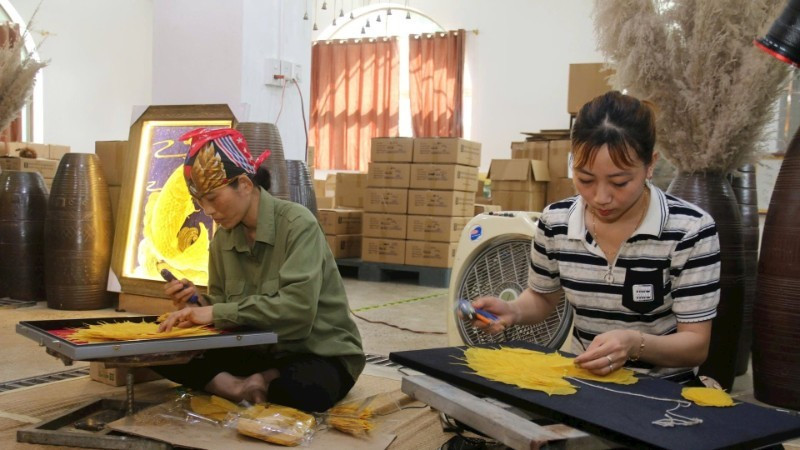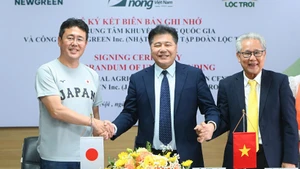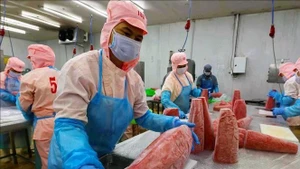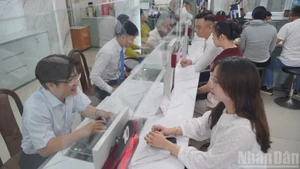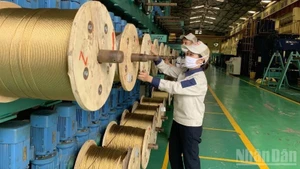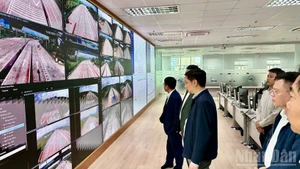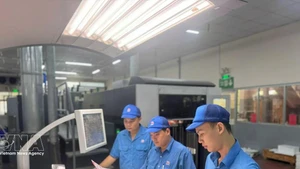In addition to agricultural products, many agricultural products and handicrafts have been invested in and upgraded to become national brands, contributing to improving people's lives, continuing to affirm the role of the collective economy in developing new rural areas.
Taking advantage of local raw material areas
Developing the collective economy and building local agricultural product brands based on existing raw material areas has always been considered a core factor for Ninh Binh province's agriculture to make a breakthrough. In recent years, the province has implemented many mechanisms to restructure agriculture and promote regional linkages, creating products with high economic value.
Records at Sinh Duoc Cooperative (Gia Vien) show that, taking advantage of the ancient capital land with the Bodhi tree associated with Buddhism, the cooperative has invited many artisans to create Bodhi leaf painting products, meeting 4-star OCOP standards. From seemingly simple Bodhi leaves, through the process of selection, processing, and elaborate painting, they become unique works of art, imbued with spiritual, cultural, and local identity values, well received by domestic consumers.
In addition, Sinh Duoc Cooperative has also built a model for producing health care and green consumer products (soap, essential oils, herbal salts, etc.) based on linking raw material areas with local people. According to the director of the cooperative, Vu Trung Duc, the model has taken advantage of two major advantages of Gia Sinh land: rich indigenous medicinal resources and local labor force, helping the cooperative to develop sustainable production, while preserving local identity and increasing income for hundreds of workers.
In Binh Thuan commune, Son La province, Binh Thuan General Production, Business and Service Cooperative has become a bright spot in collective economic development. With the model of linking raw tea purchasing for people, the cooperative not only helps farmers feel secure in production, limiting the situation of “good harvest, low price” but also contributes to building a stable agricultural value chain with the Trong Nguyen tea brand, increasing income for members.
Deputy Director of the cooperative Nguyen Thi Binh shared: “To build the Trong Nguyen tea brand, we cannot operate alone but must cooperate with the people. The cooperative stands up to purchase products for the people, guides the process of planting, caring, and harvesting properly, and connects with businesses and consumer markets. Thanks to that, farmers can feel secure in production, Trong Nguyen tea products have stable output, and increasingly high value”.
Sustainable rural economic development
The success of cooperative models associated with local advantages in agricultural production, handicrafts, etc. shows that the collective economy can completely become an important driving force for new rural development. According to economic experts and managers, the State and localities need to have timely support policies on land, capital, etc. so that cooperatives can proactively develop production plans, expand scale, and train human resources.
Along with that, there needs to be appropriate mechanisms and policies to ensure capital and support are directed to the right target. In Son La province, the Department of Agriculture and Environment advised the Provincial People’s Committee to issue many policies to support the development of collective economies, focusing on planning raw material areas, supporting preferential loans, transferring science and technology, and building agricultural product brands. Thanks to this participation, many cooperatives have had the opportunity to expand their scale, improve product quality, and become competitive in the market.
Chairman of the People’s Committee of Binh Thuan Commune, Duong Gia Dinh, said: “The model of Binh Thuan comprehensive production, business and service cooperatives has made an important contribution to the development of the local economy. The cooperatives’ association and product consumption not only help farmers stabilise output and feel secure in production, but also create regular jobs and increase income. The commune government will continue to accompany and support in terms of land, science and technology and trade promotion so that the Trong Nguyen tea brand in particular and other tea brands in Binh Thuan can develop more sustainably and reach further in the market.”
In the coming time, the Ministry of Agriculture and Environment will continue to accompany and support the replication of typical cooperative models, making the collective economy one of the important pillars of the economy.
Director of the Department of Economic Cooperation and Rural Development, the Ministry of Agriculture and Environment Le Duc Thinh
According to the leaders of Ninh Binh province, Sinh Duoc Cooperative has affirmed a correct direction when developing the collective economy associated with local raw material areas. This is a vivid demonstration of the harmonious combination between economy and culture, between modern development and identity preservation. The province will continue to pay attention and create conditions to replicate effective cooperative models such as Sinh Duoc.
Director of the Department of Economic Cooperation and Rural Development, the Ministry of Agriculture and Environment Le Duc Thinh emphasised that the collective economy is changing strongly with many new models associated with local advantages, applying science and technology and connecting to the market. This is the path to help farmers not go alone but together create added value and competitiveness. In the coming time, the Ministry will continue to accompany and support the replication of typical cooperative models, making the collective economy one of the important pillars of the economy.
